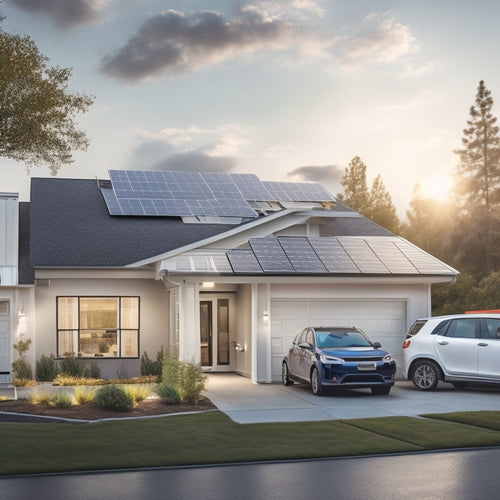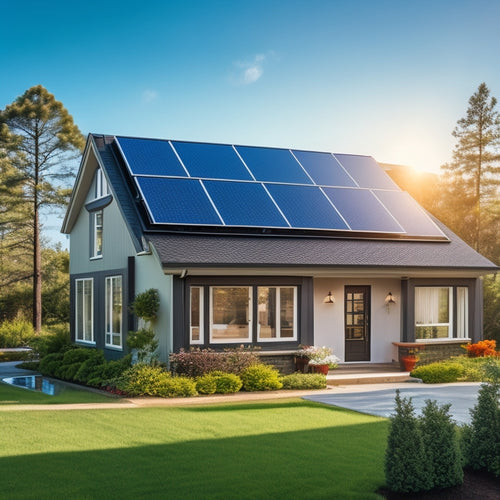
What Is the Cost of 10 Solar Panels From Top Providers
Share
You can expect to pay between $15,000 and $35,000 for 10 solar panels from top providers like Tesla, SunPower, Vivint Solar, and Trina Solar, depending on factors such as panel efficiency, installation complexity, and local incentives. Prices range from $2.40 to $3.35 per watt, with high-efficiency panels costing more. Installation costs, labor, and permits also impact the overall price. To get a better sense of what you'll pay and how to maximize your investment, consider exploring the specific costs and benefits associated with each provider, as well as the long-term savings and ROI you can expect from your solar panel system.
Key Takeaways
- The cost of 10 solar panels from top providers ranges from $15,000 to $33,500, depending on the provider and panel quality.
- High-efficiency panels from providers like Tesla and SunPower cost between $2.85 and $3.35 per watt, resulting in higher upfront costs.
- Mid-range panels from providers like Vivint Solar cost between $2.40 and $2.80 per watt, offering a balance between quality and affordability.
- Budget-friendly options from providers like Trina Solar cost between $1.50 and $2.50 per watt, but may have lower efficiency ratings.
- Total system costs include additional expenses like inverters, mounting, and installation, which can add thousands of dollars to the overall cost.
Top Solar Panel Providers
What sets top solar panel providers apart from the rest? You're looking for the best, and that means providers who stay ahead of the curve with the latest solar panel innovations.
These industry leaders invest heavily in research and development, ensuring their products boast the highest efficiency rates and longest lifespans. They're also at the forefront of emerging industry trends, such as bifacial panels and perovskite cells, which promise even greater energy yields.
When you choose a top solar panel provider, you can expect exceptional quality, durability, and performance. Their products are built to withstand harsh environmental conditions and are backed by extensive warranties.
Additionally, these providers often have strong relationships with suppliers, enabling them to offer competitive pricing without sacrificing quality. By partnering with a top solar panel provider, you're investing in a reliable, high-performing system that will meet your energy needs for years to come.
Average Cost of 10 Solar Panels
You're likely wondering what the average cost of 10 solar panels is, and it's crucial to break down the total system costs and individual panel prices to get an accurate estimate.
The overall system cost includes not only the panels themselves but also inverters, mounting hardware, and installation labor.
System Costs
As you consider investing in solar energy, deciphering the system costs becomes an essential step in determining the feasibility of your project. You need to understand the overall cost of the system, including the panels, installation, and other components, to accurately calculate your return on investment.
System costs encompass various aspects that impact your energy production and system efficiency. These include:
-
Inverter costs: The inverter converts DC power from the solar panels to AC power for your home or business.
-
Mounting and tracking system costs: The mounting system secures the panels to your roof or ground, while the tracking system adjusts the panels for peak energy production.
-
Installation labor costs: The cost of hiring professionals to install and connect the system.
- Monitoring and maintenance costs: Ongoing expenses for system monitoring, repairs, and maintenance.
Understanding these system costs helps you evaluate the overall value of your solar energy investment and make informed decisions about your project.
Panel Prices
With the system costs in view, it's vital to drill down into the specifics of panel prices, a significant component of your overall expenditure.
You'll find that the average cost of 10 solar panels varies depending on the type and quality of the panels.
For instance, high-efficiency panels from top providers like SunPower or Panasonic can range from $2.50 to $3.50 per watt, resulting in a total cost of $2,500 to $3,500 for 10 panels.
Mid-range panels from brands like Trina or Hanwha Q CELLS may cost between $2.00 and $3.00 per watt, putting the total at $2,000 to $3,000.
Budget-friendly options from manufacturers like Canadian Solar or Jinko Solar can be as low as $1.50 to $2.50 per watt, bringing the total to $1,500 to $2,500.
Keep in mind that these prices are only estimates, and the actual cost may vary depending on your location, installation requirements, and other factors.
It's important to research and compare prices from different providers to find the best fit for your energy needs and budget.
Cost Breakdown by Provider
Beyond the overall cost of solar panels, it's vital to understand how different providers factor into the equation.
You'll find that each provider offers unique solar panel types, financing options, and installation services that impact the final cost.
Here's a breakdown of what you can expect from top providers:
-
Tesla: Known for their premium solar panels, Tesla's prices range from $2.85 to $3.20 per watt, with a 10-panel system costing around $28,500 to $32,000.
-
SunPower: Offering high-efficiency solar panels, SunPower's prices range from $2.95 to $3.35 per watt, with a 10-panel system costing around $29,500 to $33,500.
-
Vivint Solar: Providing a range of solar panel types, Vivint Solar's prices range from $2.70 to $3.10 per watt, with a 10-panel system costing around $27,000 to $31,000.
- Trina Solar: Offering budget-friendly options, Trina Solar's prices range from $2.40 to $2.80 per watt, with a 10-panel system costing around $24,000 to $28,000.
Keep in mind that these estimates are rough and may vary depending on your location, installation requirements, and financing options.
Factors Affecting Solar Panel Cost
When you're evaluating the cost of solar panels, you'll find that several factors influence the final price.
Two key considerations are the system installation size, which affects the overall cost per watt, and material quality variance, which impacts the performance and durability of your solar panel system.
System Installation Size
The size of your solar panel system installation greatly impacts the overall cost of solar panels. When evaluating the cost of 10 solar panels from top providers, you need to contemplate the size of your system installation. A larger system installation requires more materials, labor, and installation permits, increasing the overall cost.
Here are 4 key aspects to ponder when evaluating the impact of system installation size on cost:
-
System efficiency: A larger system installation can lead to higher system efficiency, as more panels can be connected to generate more power.
-
Installation complexity: Larger systems often require more complex installations, which can drive up labor costs and installation permits.
-
Material costs: More panels and materials are required for larger systems, increasing the material costs.
- Roof size and layout: The size and layout of your roof can impact the installation size, with larger roofs allowing for more panels and larger systems.
Material Quality Variance
You'll find that the cost of solar panels can vary considerably depending on the material quality used in their construction. The type and quality of materials used can affect the panel's efficiency, durability, and overall performance. High-quality materials can increase the cost of solar panels, but they also provide better performance and longer lifespan.
| Material Quality | Impact on Cost and Performance |
|---|---|
| High-efficiency cells | Higher cost, increased energy output |
| Durable glass or plastic | Higher cost, improved material durability |
| Advanced manufacturing processes | Higher cost, increased efficiency |
| High-quality inverters | Higher cost, improved energy conversion |
| Premium frame materials | Higher cost, enhanced structural integrity |
Manufacturing processes also play a significant role in material quality variance. Advanced manufacturing techniques, such as automated assembly lines and precision cutting tools, can increase the cost of solar panels. However, these processes can also improve material durability and overall performance. As you consider the cost of 10 solar panels, it's crucial to evaluate the material quality and manufacturing processes used by each provider to guarantee you get the best value for your investment.
Installation Costs and Incentives
Beyond the upfront cost of solar panels themselves, installation costs and incentives play a significant role in determining the overall expense of switching to solar energy.
You'll need to take into account the cost of labor, equipment, and permits, which can add up quickly. On the other hand, you may be eligible for incentives that can help offset these costs.
Here are some key installation costs and incentives to take into account:
-
Labor costs: The cost of hiring a professional installation team, which can range from $2,000 to $5,000 or more, depending on the complexity of the installation.
-
Permitting and inspection fees: These can add up to $1,000 or more, depending on your local government's requirements.
-
Equipment costs: In addition to the cost of the solar panels themselves, you'll need to take into consideration the cost of inverters, mounting hardware, and other equipment, which can add up to $2,000 or more.
- Financing options and tax credits: You may be eligible for financing options or tax credits that can help reduce the upfront cost of your solar panel system.
When evaluating the cost of 10 solar panels from top providers, be sure to take into account these installation costs and incentives to get a clear illustration of the overall expense.
Quality and Efficiency Differences
When calculating the cost of solar panels, it's not just about the upfront expense; the quality and efficiency of the panels themselves play a crucial role in determining their overall value.
You'll want to evaluate the panel technology and its efficiency ratings, as these factors can greatly influence the amount of electricity you generate.
Efficiency ratings range from 15% to over 22%, with higher ratings indicating more energy production per unit area. Top-tier providers often offer high-efficiency panels with ratings above 20%. For instance, SunPower's X-Series Residential Solar Panels boast an impressive 22.8% efficiency rating.
In contrast, budget-friendly options might have lower efficiency ratings, around 15-17%.
While high-efficiency panels come at a premium, they can provide more power per unit area, making them a worthwhile investment for those with limited roof space.
On the other hand, if you have ample space, lower-efficiency panels might be a more cost-effective option.
Understanding the quality and efficiency differences will help you make an informed decision when selecting the right solar panels for your needs.
Warranties and Maintenance Expenses
Warranties and Maintenance Expenses
Most solar panels come with a warranty that covers defects and performance guarantees, typically ranging from 10 to 30 years. When you invest in solar panels, you want to guarantee that you're protected in case something goes wrong.
Warranty coverage is vital, as it provides you with peace of mind and financial security.
Here's what you can expect from a typical warranty:
-
Defect coverage: Manufacturers guarantee that their products are free from defects in materials and workmanship.
-
Performance guarantees: Warranties often guarantee a certain level of energy production or performance over a specific period.
-
Repair and replacement: If a panel fails or underperforms, the manufacturer will repair or replace it free of charge.
- Extended warranty options: Some providers offer extended warranty options for an additional fee, providing extra protection and peace of mind.
When it comes to maintenance, you'll need to factor in regular cleaning and inspection schedules to guarantee your panels operate at peak efficiency.
While maintenance expenses are generally low, they're vital to maximizing your energy output and extending the lifespan of your solar panels.
Long-Term Savings and ROI
By the time your solar panels are installed, you're likely wondering about the long-term benefits and return on investment (ROI). The good news is that solar panels can provide considerable long-term savings and a strong ROI.
Over their 25-year lifespan, solar panels can save you thousands of dollars on your electricity bills. According to the US Department of Energy, a typical residential solar panel system can save homeowners between $400 and $1,000 per year on their electricity bills.
This translates to a total savings of $10,000 to $25,000 over the system's lifespan.
In addition to the financial benefits, solar panels also offer a strong ROI. According to a study by the National Renewable Energy Laboratory, the average ROI for a solar panel system is around 10%.
This is considerably higher than the average ROI for many other investments, such as stocks or bonds.
Frequently Asked Questions
Can I Install Solar Panels on My Own to Save Money?
You can attempt a DIY installation to cut costs, but be aware that it may void warranties and compromise system efficiency, potentially offsetting any initial cost savings and putting your safety at risk.
Do Solar Panels Work During Power Outages?
When the lights go out, you're left in the dark, but not with solar panels. They won't work during power outages unless you have battery storage, which optimizes solar panel efficiency, allowing you to capture power when it's needed most.
Are Solar Panels Affected by Weather Conditions Like Hail?
You're wondering if solar panels can withstand harsh weather conditions like hail. The good news is that most top-tier solar panels are designed with weather resilience in mind, and hail damage is typically minimal due to their sturdy construction and protective coatings.
Can I Add More Panels to My Existing Solar System?
Can you really outgrow your current solar setup? Yes, you can! You'll need to guarantee solar panel compatibility and investigate system expansion options, allowing you to seamlessly add more panels and enhance your energy production.
Do Solar Panels Increase My Property Value?
You'll enhance your property value by installing solar panels, as they increase energy efficiency and attract eco-conscious buyers, plus, you'll benefit from solar incentives, such as tax credits, making your investment a smart, profitable move.
Related Posts
-

What Electric Vehicle Owners Need for Home Energy
As an electric vehicle owner, you need to optimize your home energy system to guarantee efficient, sustainable, and c...
-

Top Online Stores for Solar Car Accessories
When searching online for solar car accessories, you'll find top retailers like Amazon, REI Co-op, and Best Buy offer...
-

Solar Power Units Perfect for Homes
You're considering installing a solar power unit in your home, a decision that can notably reduce your reliance on tr...


